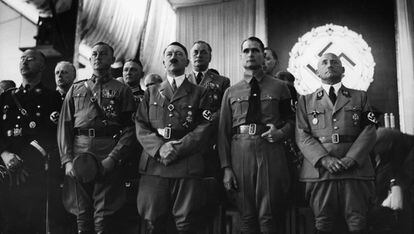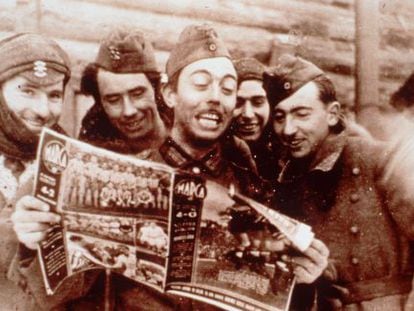Did Hitler plan a coup in the Canary Islands during World War II?
Declassified documents show British concerns about Spanish archipelago falling under Nazi control
Officially, Spain was neutral in World War II: Adolf Hitler failed to secure an alliance with General Francisco Franco during their meeting at Hendaye in October 1940 after France surrendered that June. But a collection of newly released secret documents from the National Archives of the United Kingdom has raised an intriguing what-if scenario whereby at the end of 1940, Hitler might have backed a takeover in the Canary Islands’ by its large German community.

Among the declassified documents is a report from December 11, 1940 entitled Possible German Action in the Atlantic that was read by the War Cabinet of British Prime Minister Winston Churchill.
The report came almost two months after the meeting between Hitler and Franco at the railroad station of Hendaye to negotiate – unsuccessfully – Spain’s entrance into the European war on Germany’s side.
The document explores the possibility that the Canaries might fall under the control of the Germans, giving them a strategic stronghold for their operations in the Atlantic. (The Allies themselves prepared plans the following year to invade the islands by taking the port of Las Palmas, in the event Spain joined the Axis).
The report notes “evidence” Spanish troop movements were to warn the Germans against military action
The five signatories of the report explain to the War Cabinet that while they had no indications the Germans were going to invade the Canaries “with the collusion of the Spanish authorities,” they did observe “significant military activity” on the island.
But they concluded that these troop movements were part of effort by Franco to protect the Canaries against an invasion “by any party” – meaning that if Germany were to try to take control of the islands, it would have had to do so “by force.”
The report notes “credible evidence” indicating that the troop movements were to warn the Germans against any kind of military action in the Canary Islands.
The Allies were concerned that Hitler might attempt to seize control of the Canaries by supporting a coup.
Such a coup would have been highly feasible, as a sizable German community was already present in the archipelago (“some 2,000 have recently arrived by plane),” and a large number of German ships were moored at different ports throughout the archipelago. Additionally, the situation in the Canaries at the time was conducive to an uprising – a result of “poor economic conditions” and “disaffection with the regime” of Francisco Franco.
The report concludes that had Hitler tried to foment a coup, it would have been backed by the German navy. The evidence suggested to the Allies that the Germans would not have been able to utilize aerial support to launch an invasion.
The report also reveals the Allies’ detailed knowledge of the defenses of the Canary Islands: around 10,000 soldiers, with support from 52 planes stationed at Gran Canaria Airport (24 JU 52 bombers and 28 Fiat CR 32 fighters), along with 23 other bombers available at the airport of Cape Juby, in Western Sahara on the African mainland (12 Heinkel 111s, five JU 52s, and six Savoia S 81s).
English version by Henry Hahn.












































